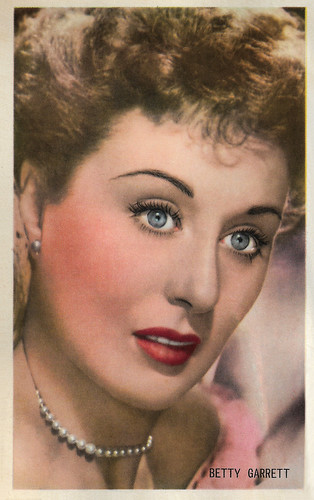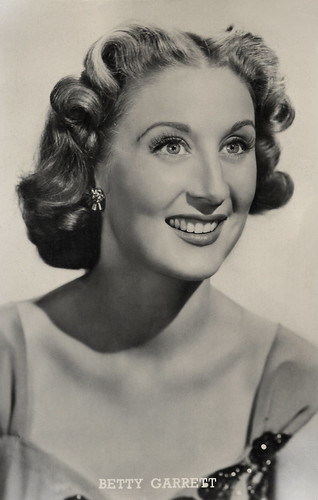
Belgian collectors card by Kwatta, no. C. 305. Photo: MGM. Publicity still for On the Town (Stanley Donen, Gene Kelly, 1949).

Belgian collectors card by Kwatta, no. C. 253. Photo: MGM. Publicity still for On the Town (Stanley Donen, Gene Kelly, 1949).
Hollywood blacklist
Betty Garrett was born in 1919 in Saint Joseph, Missouri. She was the daughter of Elizabeth Octavia (née Stone) and Curtis Garrett. Shortly after her birth, her parents relocated to Seattle, Washington, where her mother managed the sheet music department at Sherman Clay, and her father worked as a travelling salesman. His alcoholism and fiscal irresponsibility eventually led to their divorce, and Garrett and her mother lived in a series of residential hotels to minimise expenses. When Garrett was eight years old, her mother married the fiancé she had jilted to marry Curtis. They settled in Regina, Saskatchewan, where her new stepfather worked in the meat packing industry. A year later her mother discovered that her new husband was involved in a sexual relationship with his male assistant, so she and Betty returned to Seattle. After graduating from public grammar school, Garrett enrolled at the Annie Wright School in Tacoma, which she attended on a full scholarship. The school had no drama department, so she frequently organised musical productions and plays.
Following her senior year performance in 'Twelfth Night', the bishop urged her to pursue a career on the stage. At the same time, her mother's friend arranged an interview with Martha Graham, who was in Seattle for a concert tour, and the dancer recommended her for a scholarship at the Neighborhood Playhouse in New York City. There, she felt she was destined to be a dramatic actress and shied away from playing comedic roles. During the summer months, Betty Garrett performed in the Borscht Belt, where she had the opportunity to work with Danny Kaye, Jerome Robbins, Carol Channing, Imogene Coca, and Jules Munshin, and she was encouraged to hone her singing and dancing skills. She joined Orson Welles' Mercury Theatre as an understudy in what was to be its last stage presentation, a poorly-reviewed and short-lived production of 'Danton's Death' that allowed her to work with Joseph Cotten and Arlene Francis. She performed with Martha Graham's dance company at Carnegie Hall and the Alvin Theatre, sang at the Village Vanguard, and appeared in satirical and political revues staged by the Brooklyn-based Flatbush Arts Theatre, which eventually changed its name to the American Youth Theatre and relocated to Manhattan. During this period she joined the Communist Party and began performing at fundraisers for progressive causes.
Betty Garrett made her Broadway debut in 1942 in the revue 'Of V We Sing', which closed after 76 performances but led to her being cast in the Harold Rome revue 'Let Freedom Sing' later that year. It closed after only eight performances, but producer Mike Todd saw it and signed her to understudy Ethel Merman and play a small role in the 1943 Cole Porter musical 'Something for the Boys'. Merman became ill during the run, allowing Garrett to play the lead for a week. During this time she was seen by producer Vinton Freedley, who cast her in 'Jackpot', a Vernon Duke/Howard Dietz musical also starring Nanette Fabray and Allan Jones. The show closed quickly, and Garrett began touring the country with her nightclub act. Garrett then appeared on Broadway in 'Laffing Room Only', and 'Call Me Mister'. She won critical acclaim and the Donaldson Award for her performance in the latter, which prompted Al Hirschfeld to caricature her in The New York Times. It led to her being signed to a one-year contract with Metro-Goldwyn-Mayer by Louis B. Mayer.
Betty Garrett made her film debut portraying nightclub performer Shoo Shoo O'Grady in Big City (Norman Taurog, 1948). Mayer renewed her contract and she appeared in the musicals Words and Music (Norman Taurog, 1948) with Mickey Rooney, On the Town (Gene Kelly, Stanley Donen, 1949), starring Gene Kelly and Frank Sinatra, Take Me Out To The Ball Game (Busby Berkeley, 1949) with Frank Sinatra and Esther Williams, and Neptune's Daughter (Edward Buzzell, 1949) in quick succession.
Because of their past affiliations with the Communist Party, Betty Garrett and her husband Larry Parks became embroiled with the House Un-American Activities Committee, although only Parks was forced to testify. He willingly admitted that he had been a member of the party and initially refused to name others, but he later did so. Despite this, he found himself on the Hollywood blacklist. Garrett also had trouble finding work, although as the mother of two young sons, she did not mind being unemployed as much as her husband did. The Jolson Story (Alfred E. Green, 1946) starring Larry Parks, had been a huge hit in the United Kingdom, so Garrett and Parks decided to capitalise on its popularity by appearing at the London Palladium and then touring the U.K. with their nightclub act. Its success prompted them to return to the country three times but the increasing popularity of television eventually led to the decline of music hall entertainment.

Belgian postcard by Nieuwe Merksemsche Chocolaterie S.P.R.L., Merksem (Antwerp), no. D 17. Photo: MGM. Betty Garrett and Xavier Cugat are studying the artwork for the book 'Rumba is My Life' by Xavier Cugat, published in 1948.

British postcard in the Picturegoer Series, London, no. W 853. Photo: Metro-Goldwyn-Mayer.
The nemesis of Archie Bunker
Betty Garrett was then cast opposite Janet Leigh and Jack Lemmon in My Sister Eileen (Richard Quine, 1955), a musical remake of a 1940 theatrical adaptation of stories by Ruth McKenney. Garrett got the part when Judy Holliday dropped out of the project due to a contract dispute. The following year she and Parks replaced Holliday and Sydney Chaplin in the Broadway production of 'Bells Are Ringing' during their vacation from the show. Parks formed a highly successful construction business, and eventually, the couple owned many apartment buildings which were scattered throughout the Los Angeles metropolitan area. Rather than sell them upon completion, Parks decided to retain ownership and collect rents as a landlord, a decision that proved to be extremely profitable. Over the next two decades, Garrett worked sporadically, appearing on Broadway in two short-lived plays, 'Beg, Borrow or Steal' with Parks and 'A Girl Could Get Lucky' with Pat Hingle, and a musical adaptation of 'Spoon River Anthology'. On TV she made guest appearances on The Dinah Shore Chevy Show (1961), The Lloyd Bridges Show (1962), and The Fugitive (1964).
In the fall of 1973, the hit TV show All in the Family added two new people to the neighbourhood, Frank Lorenzo and his feisty Irish-American wife, Irene. Producer Norman Lear had been the publicity man for 'Call Me Mister', All in the Family writers Bernard West and Mickey West knew Garrett from her time with the American Youth Theatre, and Jean Stapleton had been in the cast of 'Bells Are Ringing', so Garrett appeared to be a frontrunner for the role of Irene. It went instead to Sada Thompson, but Thompson, unhappy after filming one episode, asked to be released from her commitment, freeing the role for Garrett. Irene was Catholic — a source of annoyance for Protestant Archie — and assumed many of the household duties normally associated with husbands, and she, therefore, presented a kind of nemesis to Archie Bunker. She later worked with Archie at his place of employment, driving a forklift, and was paid less than the man she replaced (but more than Archie).
Garrett remained with the series from 1973 through 1975. She won the 1974 Golden Globe for her performance in the series. The following year, Garrett was performing her one-woman show 'Betty Garrett and Other Songs' in Westwood when she was offered the role of landlady Edna Babish in Laverne & Shirley (1976-1981). The character was a five-time divorcée who eventually married Laverne's father Frank. Although Garrett reportedly felt she was never given enough to do on the show, she appreciated the fact that her musical talents occasionally were incorporated into the plot. In 1981, when the series was extended beyond what had been intended to be its final season, Garrett was forced to drop out because she already had committed to performing with Sandy Dennis, Jack Gilford, Hope Lange, and Joyce Van Patten in 'The Supporting Cast' (1981) on Broadway. The play closed after only eight performances, but returning to Laverne & Shirley was not an option, as the writers had explained Edna's disappearance by having her divorce Frank, although this was not directly addressed until the series' final season.
In the ensuing years, Betty Garrett appeared on television in Murder, She Wrote (1987-1991), The Golden Girls (1992), Harts of the West (1994), Union Square (1998), Boston Public (2003), Becker (2003; for which she was nominated for the Emmy Award for Outstanding Guest Actress in a Comedy Series), and Grey's Anatomy (2006), among others, and on stage in 'Plaza Suite' with Larry Parks, 'And Miss Reardon Drinks A Little', 'Meet Me in St. Louis' as Katie, the feisty Irish maid, and the 2001 Broadway revival of 'Follies', receiving excellent notices for singing 'Broadway Baby'. At Theatre West, which she had co-founded in 1962, she directed Arthur Miller's 'The Price' and appeared in the play 'Waiting in the Wings'. Her last film appearance was in Dark and Stormy Night (Larry Blamire, 2009), an independent film spoofing the haunted house and murder mystery films produced by Hollywood in the 1930s and 1940s. She won the Los Angeles Drama Critics Circle Award twice, for 'Spoon River Anthology' and 'Betty Garrett and Other Songs'. Garrett received a star on the Hollywood Walk Of Fame in 2003 on her 84th birthday.
In 1944, while appearing in Los Angeles, Garrett was invited to perform a comedy sketch at the Actor's Lab in Hollywood and met Larry Parks, who was producing the show. He invited her to join him for a drink, then drove her to the top of Mulholland Drive and told her, "You're the girl I'm going to marry." During the next two weeks, the two were inseparable. Garrett departed for a nightclub engagement in Chicago. Eventually, Parks joined her and introduced her to his mother, who lived in nearby Joliet. Parks returned to Los Angeles to begin filming Counter-Attack and Garrett travelled to New York to prepare for 'Laffing Room Only' with Olsen and Johnson. Before rehearsals began she called Parks and proposed marriage. The two were wed on 8 September 1944, four months after their initial meeting. Garrett and Parks spent a month honeymooning in Malibu Beach, and they then lived apart for the next two years while pursuing their careers. Garrett and Parks remained married until he died in 1975. They had two sons, composer Garrett Parks and actor Andrew Parks. Betty Garrett had one granddaughter, Madison Claire Parks, by her son Garrett Parks, and daughter-in-law, Broadway actress Karen Culliver. In February 2011, Betty Garrett was admitted to Ronald Reagan UCLA Medical Center in Los Angeles due to dilation of her aorta. She died from this at the age of 91. Her body was cremated.

British postcard in the Film Star series by Show Parade Picture Service, London, no. P 1175. Photo: Metro-Goldwyn-Mayer.

Belgian postcard. Photo: Metro-Goldwyn-Mayer.
Sources: Wikipedia (English and Dutch) and IMDb.
No comments:
Post a Comment